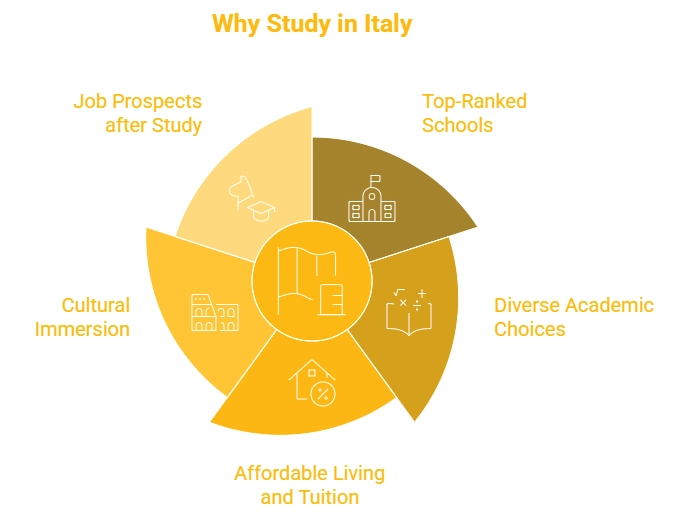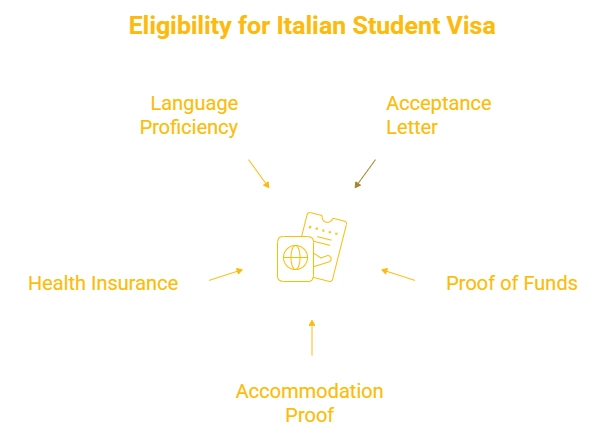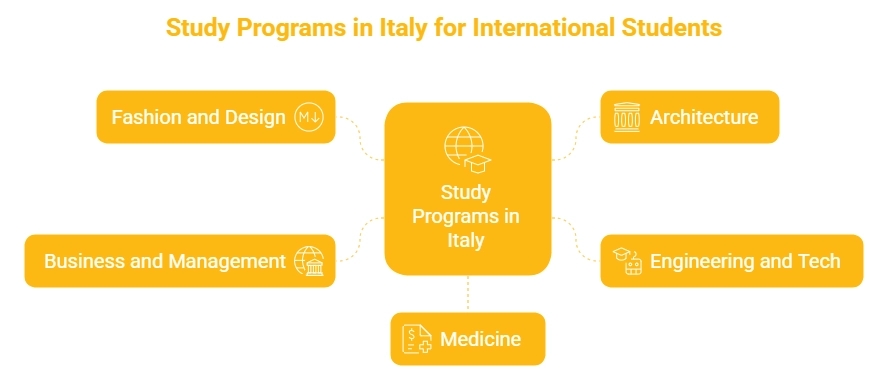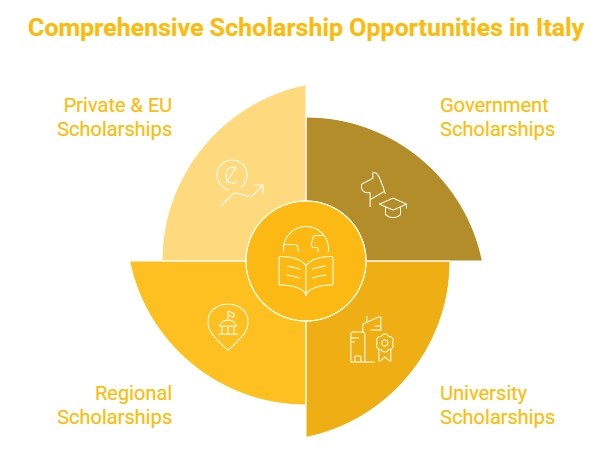Study in Italy
Don't know what to do?
Get Free Counseling
Why Study in Italy?
Italy is quickly becoming a preferred destination for UK students seeking education abroad because of its rich art, history, and innovative environment. The country's universities are globally ranked, tuition is cheap, and there is a vibrant lifestyle, making it a compelling alternative to traditional study destinations like US or Australia. Italy has something for everyone, whether you are interested in Renaissance architecture, modern fashion, or strict academic studies.
- Tuition fees at Italian public universities range from €500 to €4,000 annually, positioning Italy as an affordable option for students in Europe.
- Italy boasts more than 40 universities in the QS World University Rankings, such as the University of Bologna, which is the oldest university in the Western world.
- Italy has a sizable international student population of over 109,000, fostering a vibrant and multicultural atmosphere that is good for making contacts.
- There are over 600 degree programs taught in English, especially in subjects like engineering, fashion, business, and medicine.
- Italy has the most UNESCO World Heritage Sites and a central location in Europe, making it easy to travel and explore different cultures.
Top Reasons to Study in Italy
Here are some main reasons why Italy is a great option for students from the UK:
1. Top-Ranked Schools
- Italy has many schools that are highly ranked in both Europe and the world. For example, Politecnico di Milano, Sapienza University of Rome, and the University of Bologna are known for their good academics and research.
2. Diverse Academic Choices
- No matter if you want to study engineering, fashion, medicine, or the arts, Italy has programs for international students. Schools such as Istituto Marangoni for fashion and Domus Academy for design bring in students from all over.
3. Affordable Living and Tuition
- The yearly cost for public universities is between €500 and €4,000, based on your income and what you study. Living costs are reasonable, mostly in smaller cities like Padua or Siena.
4. Cultural Immersion
- When you study in Italy, you get to live in a place with many UNESCO sites, famous food, and a long art history. You learn in class and by experiencing the culture.
5. Job Prospects after Study
- After graduating, Italy gives students a 12-month visa to find work, which lets them look at job options and start working in Europe.

Eligibility for Italy Student Visa
Students from the UK who want to study in Italy need a Type D student visa. To get this visa, you must meet the following criteria:
- Provide an official acceptance letter from a recognized Italian university.
- Proof of sufficient funds about €6,000 each year.
- Proof of accommodation in Italy, like a lease or confirmation from university accommodation.
- Have health insurance that covers at least €30,000 in medical costs.
- Prove English or Italian Proficiency for your program.

Italy Student Visa Requirements
To apply for your student visa, be sure to gather the items on this checklist:
- A completed visa application form
- A valid passport (with at least two blank pages that is valid for at least three months past your planned stay)
- Two recent passport-size photos
- An official acceptance letter from the Italian University
- Proof of where you will be staying in Italy
- Financial paperwork (such as bank statements, a sponsor letter, or scholarship proof)
- A health insurance plan (with at least €30,000 coverage)
- Flight itinerary or travel booking
- A cover letter that explains your study plans and future goals
All documents must be translated to either Italian or English and be notarized, if needed.
Italy Student Visa Processing Time
Visa processing schedules change based on the time of year and how busy the consulate is. Here is what you should know:
Typical Processing: 15-30 working days
Peak Period (July-September): May take up to 90 days
Recommended Timeline to Apply: To prevent delays, apply a minimum of 3 months before your planned travel date.
You must schedule a meeting at the closest Italian consulate in the UK for an interview.
Top Universities in Italy
Italy’s universities combine academic excellence with historic prestige. Here are some of the best options for UK students:
|
University |
QS World Ranking |
Location |
Notable Programs |
|
Politecnico di Milano |
98 |
Milan |
Engineering, Design, Architecture |
|
Sapienza University of Rome |
128 |
Rome |
Medicine, Humanities, Sciences |
|
University of Bologna |
138 |
Bologna |
Law, Philosophy, Political Science |
|
University of Padua |
233 |
Padua |
Physics, Medicine, Psychology |
|
University of Milan |
276 |
Milan |
Biotechnology, Economics |
|
Politecnico di Torino |
242 |
Turin |
Engineering, IT, Urban Planning |
Top Courses to Study in Italy
Italy offers wide range of programs that appeal to overseas students. Some common fields of study include:
Fashion and Design
Milan is a fashion center. Schools like Istituto Marangoni and Domus Academy offer cutting-edge programs in fashion design, styling, and luxury brand management.
Architecture
Italy's architectural past makes it a great place for future architects. Programs usually have visits to historic places and design projects.
Engineering and Tech
Politecnico di Milano and Politecnico di Torino are strong in engineering education. They offer programs in mechanical, civil, and computer engineering.
Business and Management
Schools such as Bocconi and Luiss Business School provide MBAs and master's programs in finance, marketing, and starting new businesses that are known globally.
Medicine
Italy has cheap medical degrees taught in English, which include rigorous training and work in clinics. Admission is competitive and requires passing the IMAT exam.

Cost of Studying in Italy
|
Program Type |
Public Universities |
Private Universities |
|
Undergraduate |
€500 – €4,000/year |
€6,000 – €20,000/year |
|
Postgraduate |
€1,000 – €5,000/year |
€7,000 – €25,000/year |
|
MBA |
€8,000 – €12,000 |
€20,000 – €38,000 |
Tuition fees at public universities are often income-based, meaning students from lower-income families pay less.
Living Cost in Italy
|
Expense Category |
Monthly Cost (€) |
|
Accommodation |
€300 – €700 |
|
Food & Groceries |
€150 – €250 |
|
Transport |
€25 – €45 |
|
Utilities & Internet |
€50 – €100 |
|
Leisure & Personal |
€50 – €100 |
Total monthly living costs range from €700 to €1,200 depending on the city and lifestyle.
Scholarships in Italy for International Students
Italy provides many scholarships for international students to help with their finances:
Government Scholarships:
The Italian government offers scholarships to foreign students in master’s or PhD programs, which include a monthly allowance and cover tuition.
University Scholarships:
- The University of Bologna gives international students scholarships of €11,000.
- The University of Padua offers complete tuition waivers and annual grants of €8,000.
- Politecnico di Milano has merit-based scholarships that pay for tuition and living costs.
Regional Scholarships:
- EDISU Piemonte scholarships are for students in the Piedmont region and are based on both merit and financial need.
Private& EU Scholarships:
- Invest Your Talent in Italy: Targets students in engineering, technology, and economics. Includes €9,000 stipend and free Italian language course.

Steps to apply for Italy Student Visa
To assist UK students with their visa applications, here is a guide:
Step 1: Get an acceptance letter from your selected university.
Step 2: Collect all necessary documents, such as financial statements, health insurance info, and housing details.
Step 3: Schedule a visa interview at the Italian consulate in London, Manchester, or Edinburgh.
Step 4: Submit your documents and attend interviews about your academic plans.
Step 5: Follow your application's progress online or through email.
Step 6: After approval, get your visa and prepare to travel.
Step 7: Within 8 days of arrival in Italy, register at the local police station.
Post-study Work Visa in Italy
Job-Seeking Visa: Graduates can stay for up to 12 months to find employment.
Work Permit: Convert your student permit to a work permit once you have a job offer.
Why Choose Y-Axis?
- Professional Advice for UK Applicants: Tailored assistance for UK students submitting applications to universities in Europe.
- End-to-End Application Support: Everything under one roof, from choosing a university to applying for a visa.
- Scholarship Help: We assist you in locating and submitting applications for the top scholarships for which you qualify.
- Preparation and Review of Documents: Proper documentation is necessary to prevent application delays or rejections.
- Trusted by Thousands: More than 1 million customers have used Y-Axis to successfully complete their international education.
